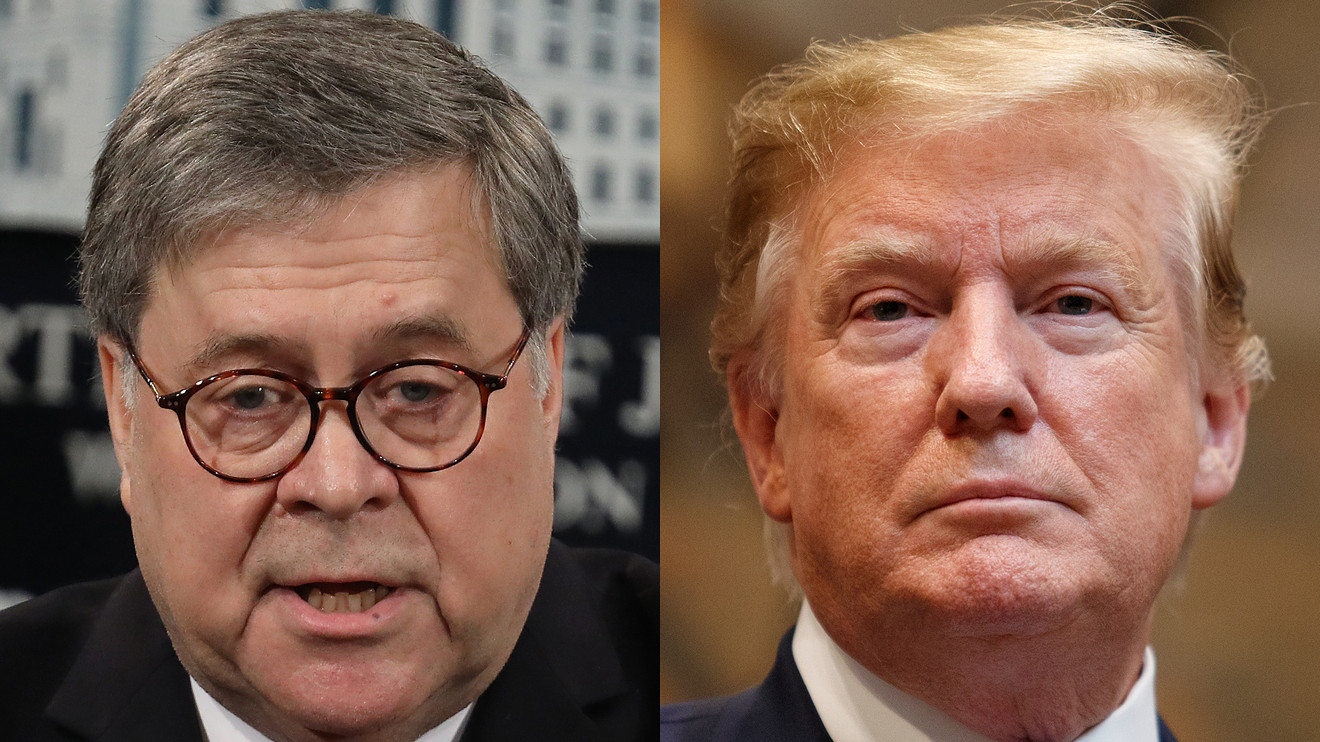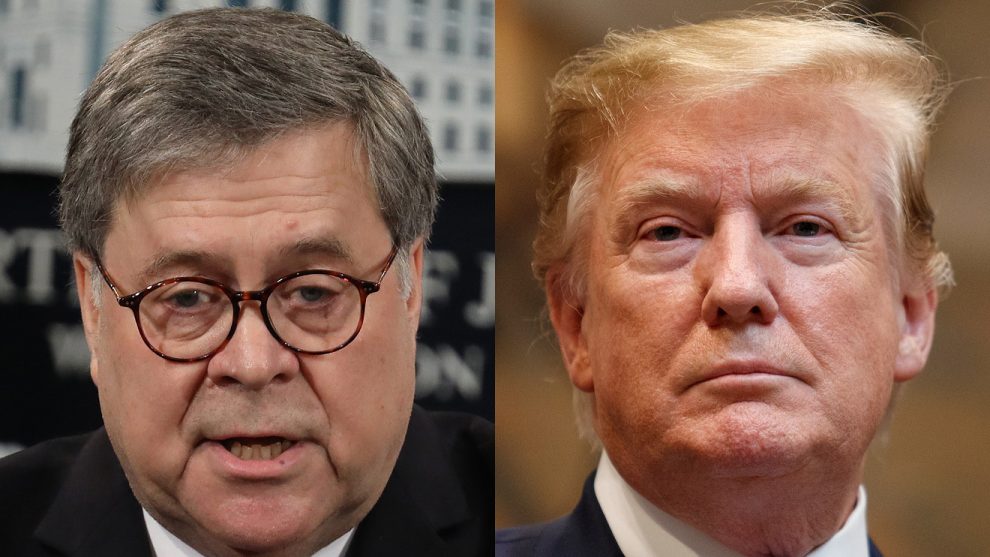
Normally, the first sign that a Donald Trump minion is lying is when his lips begin to move.
In the case of Attorney General William Barr, excusing the long-running conduct of the president of the United States, it was when he began to go on Thursday morning about Trump’s frustration, not corrupt intent, being the source of his repeated, public cases of obstruction of the Justice Department’s investigation of the 2016 election.
“As the special counsel’s report acknowledges, there is substantial evidence to show that the president was frustrated and angered by a sincere belief that the investigation was undermining his presidency, propelled by his political opponents,” Barr said. “Apart from whether the acts were obstructive, this evidence of non-corrupt motives weighs heavily against any allegation that the president had a corrupt intent to obstruct the investigation.”
Oh, my. It couldn’t have been less convincing if he had conjured the tiniest of tears. It evoked the work of actress Meghan Markle on “Suits” before she roped in Prince Harry. And it got even less so when the report of Special Counsel Robert Mueller came out later Thursday morning.
Keystone Kop president
Reading the report, as we all are, let’s cut to some chases. There’s actually plenty of evidence, both of conspiracy with the Russian government by Trump campaign officials to improperly influence the election and accept criminal acts by the Russians that the campaign knew were intended as in-kind contributions to the campaign. Arguably the candidate himself sought to custom-order one of those moves. Certainly there are plenty of facts disclosed about the president’s repeated, if Keystone Kop-like, moves to obstruct justice. That the department decided not to go forward with more charges than the indictments already brought, and no indictment of the president, is a matter of discretion.
What’s not in doubt is this: When it counted, Trump could be counted on to put himself first. And America last.
Because, let’s recall, how Donald Trump actually spent his first days in office — courtesy, in part, of the Twitter feed on which he lavishes so much executive time. Remember, the Mueller probe officially started May 17, 2017. Here’s some of what Trump did for four months before that.
An inauspicious start
On Jan. 20, he went to parties after giving the most hateful inaugural address in memory — in fact, pretty much the only hateful, hate-filled inaugural address in memory.
On Jan. 21, he sent then-Press Secretary Sean Spicer to the White House podium to tell absurd lies about the tiny crowd at the inauguration, a drop-off from past soirees amply documented by everything from photos to ridership figures from the Washington Metro.
Also on Jan. 21, he spent time tweeting about the worldwide series of women’s marches resisting his agenda.
On Jan. 27, he signed the so-called Muslim Ban barring visitors from majority-Muslim nations, which was promptly tossed out in court because Trump had so many times advertised its discriminatory intent on the campaign trail. A revised version later passed court review.
Days later, Trump spent a couple of days lying on Twitter about his telephone argument with Australia’s prime minister about immigration.
On Feb. 3, he got into a flame war with Arnold Schwarzenegger about ratings for “The Apprentice” and “Celebrity Apprentice.” He also managed to tweet about TV ratings for his inauguration, gave a badly received speech at Central Intelligence Agency headquarters (and lied about it on Twitter), and took time to claim he didn’t know Russian strongman Vladimir Putin.
Back up a few days, on Jan. 26, then-Deputy Attorney General Sally Yates warned the White House that National Security Advisor Michael Flynn had lied to the FBI about his contacts with Russia.
On Feb. 13, Trump fired Flynn, who, in the interim, had bizarrely stormed to the podium at a press briefing to warn Iran that it was “on notice.” Of what, who knows?
On Feb. 14, Trump told then-FBI Director James Comey that he hoped Comey would drop his investigation into Flynn.
And many more.
Underwhelming success
The only real work that got done was nominating Judge Neil Gorsuch to the Supreme Court. And celebrating the confirmation of Defense Secretary Jim Mattis (who would quit in disgust) and Secretary of State Rex Tillerson (who would be canned, ironically while “on the can” himself, after reports he called the president a moron).
Finally, on March 20, congressional negotiators — with little input from the White House — unveiled a proposal to repeal the Affordable Care Act, President Obama’s signature health-care law. Despite Trump’s repeated promises — and repeated claims — it contained no provision to replace the ACA’s plan to provide health insurance to 23 million previously uninsured people, to protect patients with pre-existing medical issues, and so on.
Visions of Nixon
Maybe that’s the distraction Barr was talking about. Maybe without those Big Mean Investigators and Reporters, Trump might by then have appointed a cabinet that could stand him, found the votes for Obamacare repeal and thought of a replacement.
Heck, maybe he would have written a tax-cut bill before the Senate did it for him in the summer and fall.
Barr wants us to know this president otherwise would love to curl up with a nice tome about tax law and some policy papers about health insurance.
And some cocoa.
And Melania.
But, actually, contra Barr, 2017 wasn’t the first time a criminal investigation overshadowed the launch of a president’s term. In 1973, the Watergate probe closed in on Richard Nixon as his second inauguration loomed.
On Jan. 23, 1973, at a time comparable to when Trump was still conning the connable that pictures of his inauguration were doctored, Nixon announced the treaty that ended American involvement in the Vietnam War.
And Nixon was as big a crook as crooks come.
So, Mr. Barr, the early stages of the Russia investigation didn’t stop Trump from doing his job, any more than it stopped Nixon. He just didn’t want to. And frustration is not a defense to obstruction of justice, even if Trump’s frustration had ever been about anything more than the failure of the American people, who actually voted in a plurality for his opponent, to sufficiently love him.
Which it wasn’t. Because with Trump, it’s never about anything else.
Other reporting, and other columns, will document other lies. But understanding them begins with parsing the whopper Barr began the day with.
Tim Mullaney is a columnist who covers economics and politics for MarketWatch.








